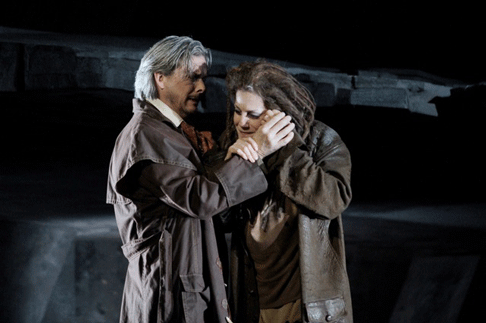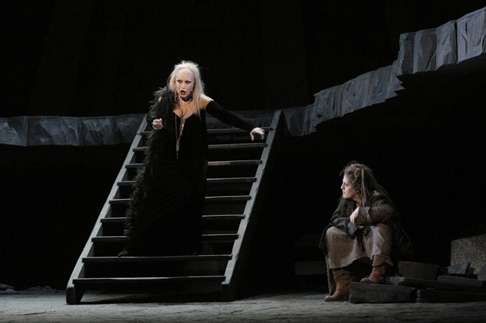Elekta’s sadistic fantasies are surely equaled by the sadistic torture of the soprano by Richard Strauss. American soprano Jeanne-MichËle Charbonnet (born in New Orleans) inhabited the cutaway basement of a soaring Mycenaean palace for the nearly two hour stint of vocal abuse.
There were no surprises in this restaging of Opera de Marseille’s 2003 Charles Roubaud production. There was no metaphor save image derivation from the first moments film art, this new medium at one with the distortions of reality mined by the new century’s exploration of psyche. Twisted psyches in particular. Set designer Emmanuelle Favre provided a greatly exaggerated double perspective in black and white, and costume designer Katia Duflot worked both in black and white and in color with an art nouveau richness though not tone. It was a simple and effective mise en scËne by its producers.
 Nicolas Cavalier as Orest and Jeanne-MichËle Charbonnet as Elektra
Nicolas Cavalier as Orest and Jeanne-MichËle Charbonnet as Elektra
Jeanne-MichËle Charbonnet reads as an appropriately young Elektra, physically and vocally. She projected the degradation of physical beauty brought on by depressive obsession, and she evoked our basic sympathy for such a sad creature. She raged in big, pure tones that were sometimes beautiful and sometimes ragged, and sometimes we feared for her stamina only to be reassured and then put on edge again. Her dance finished, dead on the floor, la Charbonnet had convinced us she was a real Elektra, not simply a soprano who could sing it, more or less.
The conducting did hold surprise. Veteran maestro Pinchas Steinberg imposed a very measured pace that offered startling insight into the softer, even tender moments of Straussian expressionism. This when it did not threaten to stall all emotional flow. The Oreste and Elektra scene was of spectacular beauty and tenderness and still very brutal. Oreste, bass Nicolas Cavallier (an actor turned singer) exuded the not-so-subtle sexual satisfaction Elektra feels as her fantasies slowly and carefully moved toward climax.
The coup de grace of the afternoon was however the screams, possibly amplified, of the murdered Clytemnestra, sung screams rather than the usual extended gut grunt. Mezzo-soprano Marie-Ange Todorovitch offered a well sung, through sung version of this complex, tragic personage that revealed in fact a much larger and far more complete personage than the usual half-voiced monster. Mme. Todorovitch made her scene with Elektra maximally vivid, reveling in the shattered exposition of her fears, exquisitely costumed in black gown with a platinum blond wig.
German soprano Ricarda Merbeth provided big, luminous tones non-stop as ChrysothÈmis, costumed in colorful flowers befitting her maidenhood (Mme. Merbeth sings Salome as well). This fine singer succeeded in projecting the larger attitudes of her character without plumbing the vocal and histrionic depths of this character antidote to sister and mother.
 Marie-Ange Todorovitch as Clytemnestra adn Jeanne-MichËle Charbonnet as Elektra
Marie-Ange Todorovitch as Clytemnestra adn Jeanne-MichËle Charbonnet as Elektra
Patrick Raftery retains sufficient voice to deliver a pallid Aegistus, the limit of the role for Strauss and metteur en scËne Roubaud. The overseer and maid servants, train bearer and confidant were appropriately rendered (no small compliment), who with a number of strikingly costumed supernumeraries made sick and lively stage pictures from time to time on the upper levels of the soaring set.
The OpÈra de Marseille deployed seventy-six musicians. That seemed not quite enough, particularly when the maestro needed huge string sounds to develop the voluptuous moments of the Strauss score. The baignoires on both sides of the pit each housed a partial number of the eight timpani Strauss requires, rendering the great climaxes in stereo — maximally powerful! Boxes further above housed percussion and harps whose sounds floated eerily in the higher reaches of the hall with an acoustic appropriateness to the psychic pings of the Strauss drama.
It was a fine afternoon.
Michael Milenski
Cast and Production
Elektra: Jeanne-MichËle Charbonnet; ChrysothÈmis: Ricarda Merbeth; Clytemnestre: Marie-Ange Todorovitch; First Servant: Lucie Roche; Second Servant: Christine Tocci; Third Servant: Simona Caressa; Fourth Servant: BÈnÈdicte Rousseno; Fifth Servant: Sandrine Eyglier; Overseer: Anne-Marguerite Werster; Aegisthe: Patrick Raftery; Oreste: Nicolas Cavallier; PrÈcepteur d’Oreste: Erick Freulon; Young Servant: Avi Klemberg; Old Servant: Christophe Fel. Chorus and Orchestra of the OpÈra de Marseille. Conductor: Pinchas Steinberg; Mise en scÈne: Charles Roubaud; Scenery: Emmanuelle Favre; Costumes: Katia Duflot; Lighting: Marc DelamÈziËre. OpÈra de Marseille. February 10, 2013.
image=http://www.operatoday.com/Elektra_Marseille.gif
image_description=Jeanne-MichËle Charbonnet as Elektra [Photo by Christian Dresse courtesy of OpÈra Municipal de Marseille]
product=yes
product_title=Elektra in Marseille
product_by=A review by Michael Milenski
product_id=Above: Jeanne-MichËle Charbonnet as Elektra
Photos by Christian Dresse courtesy of OpÈra Municipal de Marseille